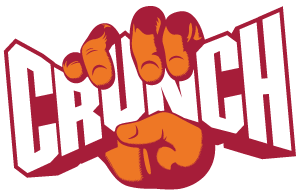We couldn’t be more excited to reveal some incredible insights into weight loss results from one of our exceptional professional fitness coaches here at Crunch. Our coach has dedicated years of experience to empowering individuals to reach their full potential and shares invaluable advice on achieving long-term weight loss success. Brace yourself for inspiration as we delve into the secrets of successful weight loss, straight from our expert coach’s repertoire.
It’s likely that you’ve attempted to lose weight in your life, you’ve tried to lose weight or you’re about to embark on your weight loss journey. If you are, then I’m sure you’re curious about how your body will change and how quickly you’ll notice progress.

Weight loss progress can be a physical and emotional minefield. In a world where you’re continually bombarded by social media that promotes instant gratification and inspirational transformations, it’s common to think that weight loss should feel like an “overnight” process. And, it’s easy to feel disappointed when you don’t see a massive transformation in a few weeks after drastically changing your diet and exercise routine.
You’ve probably heard the following phrase:
“IN TWO WEEKS, YOU’LL FEEL IT. IN FOUR WEEKS, YOU’LL SEE IT. IN EIGHT WEEKS, YOU’LL HEAR IT.”
But is this really the case? Let’s get into the finer details and why it’s often more complex than a matter of weeks of hard work and give you some realistic expectations of what to expect when it comes to seeing results.
The first few weeks: why you’ll see fluctuations on the scale
Now that you know the difference between fat loss and weight loss, let’s discuss the results and why it’s common to see the scale fluctuate in the first few weeks.
If you’re starting a new diet that involves reducing calories, predominantly through carbohydrates then initially you’ll no doubt see a change in scale weight. This is because per gram of carbohydrate you’ll hold 3-4 grams of water weight, meaning if you’re dropping 100g grams of carbohydrate out of your diet you’ll drop 300-400g literally within a day or two, you’ll also notice a difference in how you look – a little less “fluffy”.
Again this will be the drop in water so don’t think you’ve magically melted fat off of your body just yet. This is where marketers get you to buy into their magic diets and skinny teas “Drop 3-4 pounds in one week!”
Don’t be fooled, they’re just hiding the science from you.
On the other end of the spectrum, if you hop on the scale a few days later and you’ve gained back the weight you initially lost at the beginning of the week and you’ve started resistance training (weight training) then this isn’t uncommon.
When lifting weights, your body will store some carbohydrates as muscle glycogen. If you have started weights and there’s a big gap between your last weights session you will feel like your muscles have disappeared. Not to worry, they haven’t. It’s purely the muscle glycogen (carbohydrates) that aren’t there.
When we resistance train, muscle glycogen is used up and then replenished ready to be able to exert force so initially, you may see weight stagnate or remain the same.
If you are finding yourself getting emotionally attached to the number on the scale, here is a helpful tip for a more reliable reading. Track your weight daily (don’t worry there’s more to this tip), and then calculate the average across the week.
As mentioned earlier, your weight will fluctuate due to many factors like fluid consumed, bowel movements, sodium intake, hormonal cycle (females) and glycogen stores to name a few. Also, remember that the scale weight is purely a single piece of data and shouldn’t be the only measurement tool you use.
Some other reliable tools to utilise alongside the scale include how your clothes fit, your mood and energy, photos to show body composition and posture, and measurements of your body. There are many cases where the scale weight doesn’t change but your physical measurements change drastically or photos show a change in muscle mass to show a leaner, toned physique.
What type of training should I do?
When it comes to the physical results this is going to entirely depend on the modality of training you are going to be performing. If you want to see the biggest physical change then focusing on resistance training three to four times a week and getting stronger is going to build more lean body mass which will contribute to you seeing more physical changes in the mirror.
Combine this with some aerobic work which can be outdoor hiking, a hobby you enjoy, going for a run once or twice a week is a surefire way to give yourself the best possible result. When it comes to gaining muscle mass your first year of training is going to be your best year, men can gain up to 8kg in one year whilst females can look to gain 4-5kg, this then becomes harder the longer you train so don’t expect to be looking like Arnold Swartznegger anytime soon, progress takes years of consistency so think about this like a life long journey rather than a short term sprint.
Don’t give up too early
Have you started a new fitness journey previously and then given up because you weren’t seeing results, or you’ve become bored of the gym?
I get it, you start your fitness journey with enthusiasm, but without a clear goal or long-term plan, you may lose interest and quit.
Remember motivation follows results and results come from adhering to a clear set plan, which is mapping out a clear goal and how you’re going to get there is important, it can be super overwhelming if you’re new to fitness and that’s okay, it’s completely normal. Our team of supportive trainers are happy to help guide you and we can arrange a free consultation and goal-setting session to help you gain clarity on your path moving forward.
When it comes to results, continual progression is key to long-lasting change however have you ever found yourself just doing the same repetitive routine repeatedly? It becomes a monotonous chore, you lose interest and again you give up, this is where a long-term training plan can help.
As you progress you need to be continually challenged with new skills, new exercises and a progressive stimulus to continue to see results, it should never become “easy” that’s when you need to make it harder.
If you want to look back in the mirror and be proud of what you see, diamonds are made under pressure and the body you’ve always desired isn’t dissimilar. Do the work and you’ll be rewarded. As the Stoics say, hard things easy life, easy things hard life.
Ways to track your weight loss progress
My advice, make sure you take some progress photos if you’ve started your journey.
Take them every two weeks in the same place wearing the same thing. Not only will this aid in keeping you accountable and adhering to your new training and fitness regime, but when you look back over a year you’ll be proud of how far you’ve come.
Just be mindful if you start noticing that you are becoming overly obsessive over your body image and don’t hesitate to contact your GP if you are feeling it’s impacting your life in a negative light. You can even share your story with us here at Crunch fitness. You can check out some of our amazing member transformations here.
If you are looking for assistance with your weight loss/fitness journey, our team of supportive trainers are happy to help.
WANT A FREE GYM SESSION!?
Hit the link below to receive your FREE GYM PASS to your nearest CRUNCH Gym!
👉🏻 CLICK HERE


Crunch Fitness Virtual Assistant
 I'd like some help reaching my Fitness goals!
I'd like some help reaching my Fitness goals! I'm an existing member and would like some help!
I'm an existing member and would like some help! I have some questions about becoming a Crunch member!
I have some questions about becoming a Crunch member! AU
AU United States
United States Canada
Canada Costa Rica
Costa Rica Spain
Spain Portugal
Portugal NSW Clubs
NSW Clubs VIC Clubs
VIC Clubs